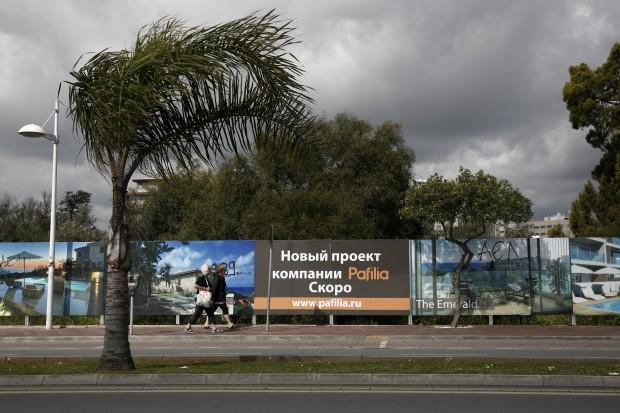Russia’s Interest in Resolving the Financial Crisis in Cyprus
Two women make their way alongside Russian advertisements about a property development in Limassol, a coastal town in southern Cyprus February 20, 2013. In this seaside Cypriot town, an image of the Kremlin’s onion domes adorns the doors of a local mini-market, Ferraris stand ready for hire by wealthy Russians and shops selling mink coats line streets drenched in warm Mediterranean sunshine. Home to over 30,000 Russians who began flocking to Cyprus after the Soviet Union’s collapse and catering to many more tourists each year, locals jokingly refer to the town, complete with Russian signs and schools, as “Limassolgrad”. Picture taken February 20, 2013. REUTERS/Yorgos Karahalis (CYPRUS – Tags: BUSINESS SOCIETY) – RTR3E5O8
Uncertainty continues about the bank bailout deal in Cyprus, where banks are closed and ATMs emptied out. The Guardian correspondent Miriam Elder is in Cyprus’ second largest city, Limassol, home to a large Russian expat community, and sometimes referred to as “LimassolGrad.”
For many in Cyprus, it’s payday, but they can’t get at their hard-earned money.
Not when the banks are closed, and that’ll continue until further notice, as the small island-nation’s leaders desperately try to negotiate a bailout from the European Union.
One proposal would pay for the bailout, in part, through a tax on people’s bank accounts.
That sparked a run on banks, prompting authorities to shut them down.
Which leaves regular Cypriots, like Nicole Drakou, unsure about what’s happening on payday.
“We were supposed to be due our salaries today,” Drakou said, “but unfortunately, with all the banks being closed, they can’t effect any transactions. There are no online transactions. From what I’ve seen on the street people are urgently trying to get to ATMS and take out as much cash as they can, hoping that our euros will be worth something tomorrow or next week.”
In addition to the EU, Cyprus was looking to Russia for some financial help.
But Friday, Russian Prime Minister Dmitry Medvedev made it clear Moscow will not help until Cyprus strikes a deal with the EU.
Russia has a lot at stake in this crisis because a lot of Russians have money in Cypriot banks.
Many of those Russians, about 40,000, actually live on the Mediterranean island.
The Guardian’s Moscow correspondent Miriam Elder arrived in Cyprus Thursday night.
She is in Cyprus’ second largest city, Limassol, home to a large Russian expat community, and sometimes referred to as “LimassolGrad.”
Our coverage reaches millions each week, but only a small fraction of listeners contribute to sustain our program. We still need 224 more people to donate $100 or $10/monthly to unlock our $67,000 match. Will you help us get there today?
